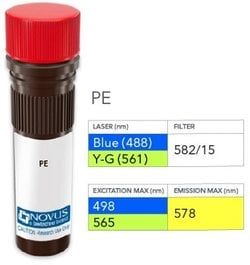c-Myc Antibody (9E10.3) - IHC-Prediluted, Novus Biologicals™
Manufacturer: Novus Biologicals
Select a Size
| Pack Size | SKU | Availability | Price |
|---|---|---|---|
| Each of 1 | NBP248082-Each-of-1 | In Stock | ₹ 47,704.00 |
NBP248082 - Each of 1
In Stock
Quantity
1
Base Price: ₹ 47,704.00
GST (18%): ₹ 8,586.72
Total Price: ₹ 56,290.72
Antigen
c-Myc
Classification
Monoclonal
Conjugate
Unconjugated
Formulation
10mM PBS and 0.05% BSA with 0.05% Sodium Azide
Gene Symbols
MYC
Immunogen
A synthetic peptide, corresponding to aa 408-439 (AEEQKLISEEDLLRKRREQLKHKLEQLRNSCA) from C-terminus of human c-Myc, coupled to KLH. (Uniprot: P01106)
Quantity
7 mL
Research Discipline
Autophagy, Cancer, Cancer Stem Cells, Cell Cycle and Replication, Chromatin Research, Core ESC Like Genes, Epigenetics, Epitope Tags, Stem Cell Markers, Transcription Factors and Regulators, Tumor Suppressors
Gene ID (Entrez)
4609
Target Species
Human, Chicken (Negative), Mouse (Negative), Rat (Negative)
Form
Purified
Applications
Immunohistochemistry (Paraffin)
Clone
9E10.3
Dilution
Immunohistochemistry-Paraffin
Gene Alias
avian myelocytomatosis viral oncogene homolog, BHLHE39, bHLHe39MRTL, Class E basic helix-loop-helix protein 39, c-Myc, MYC, myc proto-oncogene protein, MYCC, myc-related translation/localization regulatory factor, Proto-oncogene c-Myc, Transcription factor p64, v-myc avian myelocytomatosis viral oncogene homolog, v-myc myelocytomatosis viral oncogene homolog (avian)
Host Species
Mouse
Purification Method
Protein A or G purified
Regulatory Status
RUO
Primary or Secondary
Primary
Test Specificity
It recognizes a transcription factor of 64-67kDa, identified as c-myc. Its epitope spans between aa 410-419 (EQKLISEEDL) which is a specific portion of an alpha helical region of human c-myc protein. This monoclonal antibody shows no cross-reaction with v-myc. c-myc is involved in the control of cell proliferation and differentiation and is amplified and/or overexpressed in a variety of tumors. Over-expression of c-myc protein occurs frequently in luminal cells of prostate intraepithelial neoplasia as well as in most primary carcinomas and metastatic disease.
Content And Storage
Store at 4C.
Isotype
IgG1 κ
Description
- c-Myc Monoclonal specifically detects c-Myc in Human, Chicken (Negative), Mouse (Negative), Rat (Negative) samples
- It is validated for Immunohistochemistry, Immunohistochemistry-Paraffin.


